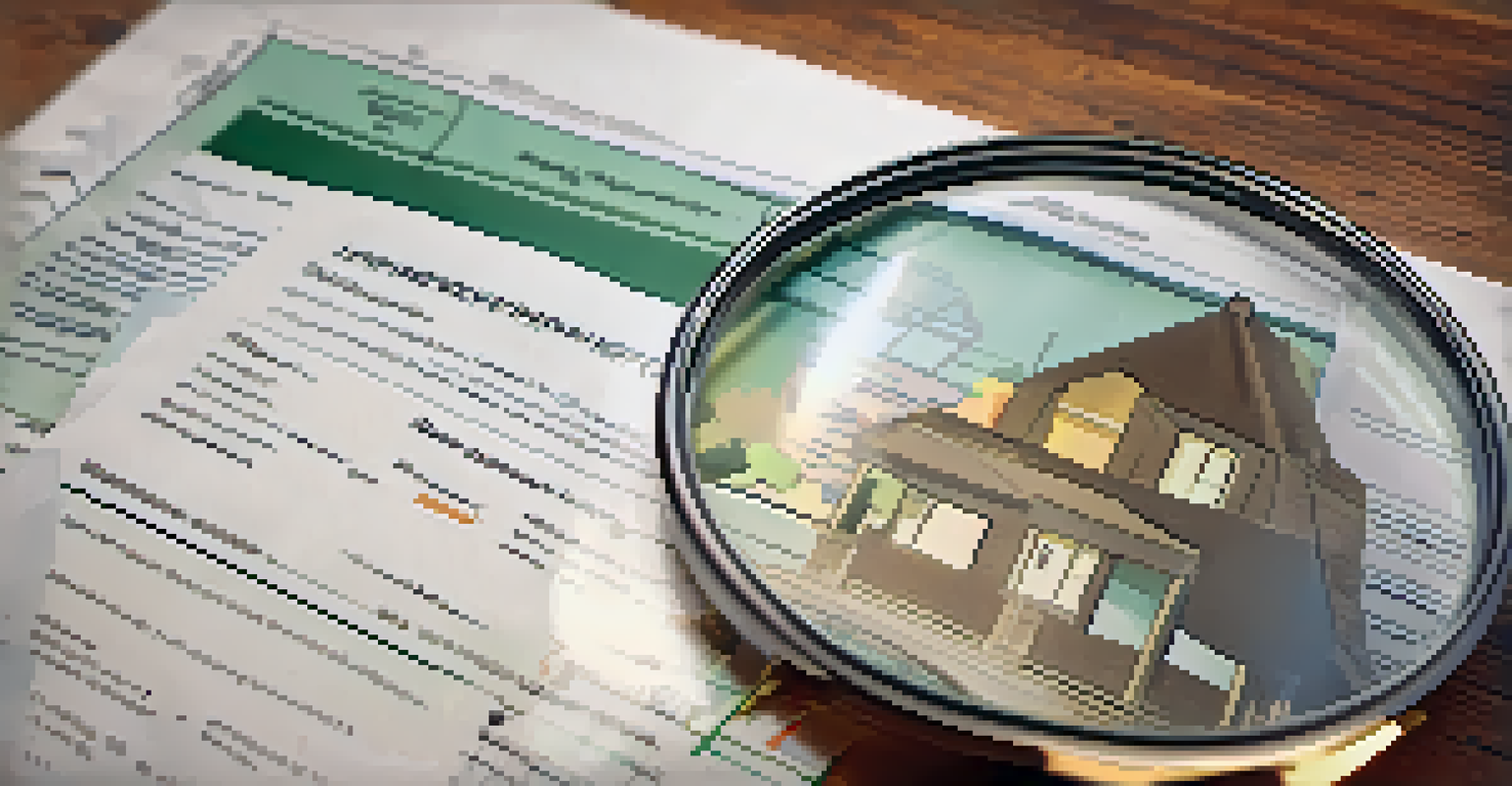Home Inspection Findings: What Needs to be Disclosed?

Importance of Home Inspections in Real Estate Transactions
Home inspections serve as a crucial step in the real estate process, helping both buyers and sellers understand the condition of a property. They provide an in-depth look at potential issues that may not be visible during a casual walkthrough. By identifying problems early, everyone involved can avoid future headaches and costly repairs, making the transaction smoother overall.
An ounce of prevention is worth a pound of cure.
When a buyer receives a home inspection report, it can feel a bit like opening a mystery box—some surprises are pleasant, while others can be quite alarming. This is why transparency in disclosing findings is essential. It not only builds trust between the buyer and seller but also helps in negotiating repairs or price adjustments.
Ultimately, having a professional conduct a home inspection can save both parties time and money, ensuring that no hidden issues derail the sale. This step is not just about compliance; it’s about fostering a positive experience for everyone involved.
What Home Inspectors Look For: Common Findings
Home inspectors check various elements of a property, including structural integrity, roofing, plumbing, electrical systems, and more. Common findings may include issues like leaks, faulty wiring, or even pest infestations. Each of these problems can significantly affect a home’s value and livability, which is why they warrant disclosure.

For instance, if an inspector notes water damage in the basement, it’s not just a cosmetic issue; it could indicate larger problems like mold or foundation concerns. These findings can impact the buyer’s decision-making process, making it essential for sellers to be upfront about them. Ignoring such issues can lead to legal ramifications down the line.
Home Inspections Build Trust
Transparent home inspections foster trust between buyers and sellers, facilitating smoother transactions.
By understanding what inspectors typically look for, sellers can proactively address concerns, making their homes more appealing. This proactive approach not only enhances trust but also increases the likelihood of a smoother transaction.
Legal Requirements for Disclosure of Inspection Findings
Every state has its own laws regarding disclosure requirements, so it's vital for sellers to familiarize themselves with local regulations. Generally, sellers are obligated to disclose any known material defects that could affect the home's value or safety. Failing to do so can lead to legal penalties, including potential lawsuits from buyers who feel misled.
Honesty is the first chapter in the book of wisdom.
For example, if a seller is aware of a leaky roof but chooses not to disclose it, they could face significant repercussions if the buyer discovers it after the sale. This situation underscores the importance of honesty; not only is it the law, but it’s also the ethical choice. Most buyers appreciate transparency and are willing to negotiate when they know the full story.
In short, understanding and adhering to disclosure laws is crucial for sellers. It protects them legally and fosters goodwill with potential buyers, paving the way for a successful sale.
Material vs. Non-Material Findings: What to Disclose
When it comes to home inspections, distinguishing between material and non-material findings is key. Material findings are issues that significantly impact the value or safety of the property, such as structural damage or mold. Non-material findings, on the other hand, might be minor cosmetic issues that don’t affect the home’s livability.
For example, a broken doorknob may be a non-material finding, while a cracked foundation is certainly material. Sellers should focus on disclosing all material findings, as these can influence a buyer’s decision. Transparency about material issues can help avoid disputes later on and demonstrates a seller's commitment to a fair transaction.
Disclosure is Legally Required
Sellers must disclose known defects to avoid legal repercussions and maintain ethical standards.
Ultimately, knowing what qualifies as material can save sellers from potential legal troubles and create a more straightforward purchasing process for buyers.
How to Handle Disclosure of Negative Findings
Disclosing negative findings from an inspection can be daunting for sellers, but handling it properly is essential. A proactive approach often yields the best results; being upfront about issues can actually foster trust with buyers. Instead of trying to hide problems, sellers should present them honestly and offer solutions or repair options.
For instance, if a home inspection reveals outdated wiring, a seller might consider providing estimates for repairs or even offering a credit to the buyer. This not only shows good faith but also helps maintain buyer interest. Transparency can turn a potentially negative situation into a constructive conversation about the home’s future.
By framing disclosures positively, sellers can create an environment where buyers feel informed and empowered to make decisions, reducing the chances of post-sale disputes.
The Role of Buyers in the Disclosure Process
While sellers have the primary responsibility for disclosures, buyers also play a crucial role in the process. They should conduct their own research and not rely solely on the home inspection report. Engaging a qualified inspector and asking questions about findings can provide a clearer picture of what to expect.
Additionally, buyers should feel empowered to negotiate after receiving the inspection report. If significant issues arise, they can request repairs or a price reduction. Being proactive and assertive can help buyers ensure they’re making a sound investment.
Material Findings Impact Value
Understanding the difference between material and non-material findings is crucial for fair negotiations.
Ultimately, both buyers and sellers need to work together transparently during the disclosure process to create a fair and satisfactory transaction for all parties.
How Disclosure Affects Home Value and Negotiations
The disclosure of home inspection findings can significantly impact a property's market value and negotiation dynamics. When sellers are upfront about issues, it can lead to more realistic pricing and prevent the dreaded 'price drop' after a buyer discovers problems. Buyers are often willing to negotiate, but only if they feel they are being treated fairly.
For example, if a home has a leaky roof that the seller discloses, a buyer may factor in the repair costs when making an offer. On the flip side, undisclosed issues that come to light later can lead to price renegotiations or even the collapse of the sale. Transparency is key; it can enhance buyer confidence and lead to smoother negotiations.

In essence, proper disclosure can not only protect sellers from legal issues but also help maintain the home’s value and ensure a more amicable negotiation process.